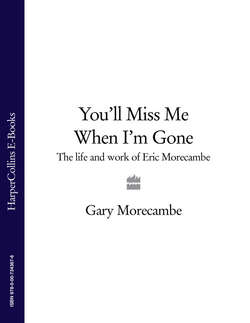Читать книгу You’ll Miss Me When I’m Gone: The life and work of Eric Morecambe - Gary Morecambe - Страница 10
From Morecambe Bay to Broadway
Оглавление‘My most special memory of Morecambe is the day the whole town came to see me off—and told me never to come back.’
As a kid Eric could only dream of the bright lights of Broadway. That, one day in the distant future, a November night in 2001, there would be a play about his (and his partner’s) life on a West End stage would have been incomprehensible.
The Play What I Wrote, in its initial concept, was an idea of mine, along with writer Martin Sterling and West End producer David Pugh. We wanted to stage a tribute to the legendary double act. It might well have remained just a drawing-board notion had it not been for The Right Size, a comedy team with a great stage track record, coming up with the initiative of writing a play about their own lives in which they happen to become like Eric and Ernie as they go about performing their own tribute to them. And so a potentially good idea turned into a well-executed reality. When actordirector Kenneth Branagh agreed to direct the project, adding West End credibility to the production, the final piece of the jigsaw was in place. And if that wasn’t good enough, the play was destined to transfer to New York after a staggeringly successful run at London’s Wyndham’s Theatre.
Ken Branagh had an early introduction to the world of Morecambe and Wise. ‘When I was fourteen,’ he told a journalist in 2002, ‘I wrote to Morecambe and Wise to ask for tickets for one of their TV shows. The letter that came back was one of the first ever addressed to me at my house. It had BBC stamped at the top of the envelope, and as I ran downstairs to collect it, my brother, who was in particularly bullying mode at the time, was so completely intrigued, he actually opened it.
‘Inside was a signed photograph. And although there were no tickets left, and I never got to see Morecambe and Wise live, I still have the photo to this day.’
Ken was fascinated by them from watching them on TV. ‘I vividly remember a documentary about Morecambe and Wise,’ he recalls, ‘and I couldn’t imagine anything more exciting than seeing what Morecambe and Wise did, and how they actually did it.’
The play was first tested at the Everyman Theatre in Liverpool. ‘We did a lot of “dying” in Liverpool,’ says Ken, through a wry smile. ‘It wasn’t right at that time. Hamish [McColl, who portrays the Ernie part of the duo] swore that the answer to making it work was to have Sean wear Eric’s glasses. So for one show we did this and planned some more Eric-like business to be going on—and it was a disaster! Total disaster!
‘Audiences weren’t having it, even though it was one inch closer to being Eric. The audience somehow needed to see the play through a kind of prism—through someone else’s physicality.
‘It took the whole month in Liverpool to work out the shape for this homage; this affectionate presentation of Eric and Ernie.’
The run on the West End stage, and the wonderful list of guest stars who appeared in the show, reached a natural conclusion, but as is so often the case with Morecambe and Wise, so much seems to continue happening with them each passing year despite both having left us some time ago. Broadway is the biggest development in the history of the show.
Catching up for lunch with Ken some six years since we worked together on the project, it was wonderful to find his enthusiasm for both Morecambe and Wise and the play itself had not remotely diminished.
‘In Hamish [McColl], Sean [Foley] and Toby’s [Jones, who played myriad roles in the production] performances you have the perfect degree of ego and neurosis that keeps it edgy and really challenging,’ he explains. ‘Because Hamish and Sean as The Right Size had been together a long time with their own successful partnership prior to the production meant that they were bringing something to it which was way beyond re-creation of Morecambe and Wise. You need to have performers who come out of a similar kind of box—hard-working and talented as the act they are paying homage to.’
We discussed the first night, and all of us associated with the play were very nervy that day as tickets had gone on sale to little reaction. ‘One of the things I remember about that first night in London,’ says Ken, ‘was the quality of the audience—all these “names” dotted around the auditorium—and feeling this huge desire for it to go well.
‘When I saw Bruce Forsyth several times leaning forward doubled up with laughter, I felt so relieved. No disrespect to Bruce Forsyth, but comedians aren’t normally regarded for their generosity to other comedians, so I took it as a very good omen that Bruce was clearly loving it.’
It was the first night success and subsequent reviews that brought about its almost immediate success.
But taking it to Broadway was always going to be a very different venture. Ken Branagh had some reservations about Broadway from the outset, which were echoed by me, The Right Size and Toby Jones.
‘It was always going to be a challenge taking the play on to Broadway,’ explains Ken, diplomatically. ‘Despite a well-worked script and the comedic skills of Hamish, Sean and Toby, what it lacked in New York that it never had lacked in the UK in its West End life and various touring productions was a massive level of affection.
